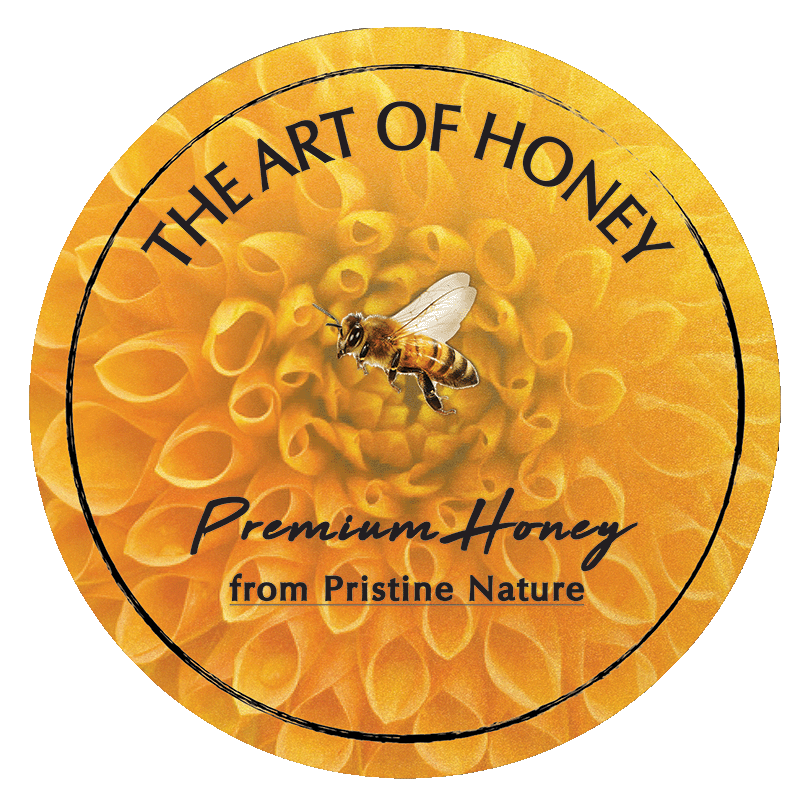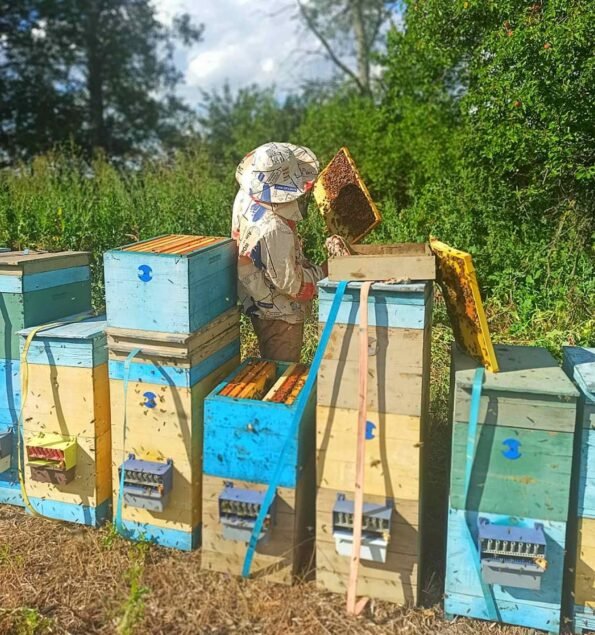Naturhonig
Origin of the honeys💜
We only source our honey from passionate beekeepers because the love/energy you put into what you do plays a big part in everything The Art of Honey does.
Purity of the Honey🍯
The honey we sell is obtained from flower nectar, honeydew from trees or leaf stalks. None of the honeys are adulterated, blended, microfiltered, or added with anything to adulterate or alter the honey’s natural flavor.
Since honey is a natural product and nature is subject to constant change, no honey tastes like the honey of the previous year. The weather determines the flowering time and the temperature determines the nectar flow. It can be a beautiful sunny day, but if the temperature is too low, the flowers won’t produce valuable nectar.
Honeybees🐝
About 50,000 bees live in an average beehive. Bees have a life expectancy of about 40 days in spring and summer. And the queen amazingly lays up to 2000 eggs every day. When a bee reaches its age, it crawls out of the hive so as not to impair the effectiveness of the colony by removing the remains. But sometimes it happens that a bee doesn’t make it in time and dies in the hive. In this case, the remains are removed from the hive by the bees so that no harmful germs can form.
Beekeeper🥰
We know all the beekeepers we work with personally. As mentioned at the beginning, these people are so passionate about what they do that it is quite a different experience to feel their humble and simple approach to life and their profession.
These Beekeepers care more about the health of their bees than honey and money because when their bees die or are unhealthy, it affects the honey production and their beekeeping income. So no harm is done to the bees.
Fine Quality Honey selected from Pristine Nature
The Art of Honey offers twenty different tastes of Honey. These have been carefully selected from many beekeepers living in the pristine nature of Ukraine, Spainand even India.
Ukraine pretty unknown in western Europe, is little developed in its countryside and so the Nature is full of flowers and insects. It’s very common for people to live in small villages in this pristine Nature and live simply from their vegetable patches, fruit trees and their beehives.
In Spain in the area between Valencia and Alicante on the eastern coast, there are unending orchard’s of Orange and Lemon trees. We have found high in a small mountain village a family of beekeepers now with the fourth generation. We are pleased to add Mediterranean honey to our collection.
The Indian Honey comes from the South of India, where the exotic vegetation and different bee species create a rich honey taste that is unlike anything we know from european honey.
We were able to select Honey almost as we would select wine travelling through France. We contacted small beekeepers, tasted a variety of honeys and the beekeepers usually knew pretty accurately from which flowers the bees had taken the honey in a particular season.
By living close to nature, the farmers were in tune with the kind of flowers that grew up in the different seasons. And by placing their hives they could quite carefully predetermine the final taste of the honey.
This unique collection from The Art of Honey offers the finest possible selection of high quality honey, from pristine nature.
Natural, Untreated Honey
Our honey is pure, just like the bees created it. No honey is mixed or otherwise denatured in any way.
It naturally crystallizes from liquid to solid.
Natural, unprocessed honey is packed with unique ingredients, therefore we source our honey directly from beekeepers with generations of experience. In its natural form, honey crystallizes at room temperature, depending on the variety.
The commercially available honey is liquid and golden in color because it has undergone heat treatment. Crystallized honey is less practical, so large honey factories heat and pasteurize their honey.
The honey can be heated to over 70 degrees, which slows down crystallization, but unfortunately destroys the honey’s special aroma and the vital enzymes in it that are responsible for activating the honey’s vitamins and minerals.
As part of the pasteurization process, many types of honey are often mixed together, resulting in an inferior mixture that tastes sweet but no longer has a special aroma and, above all, no longer has any valuable ingredients. This is what we have commonly come to know as ‘honey’.created

